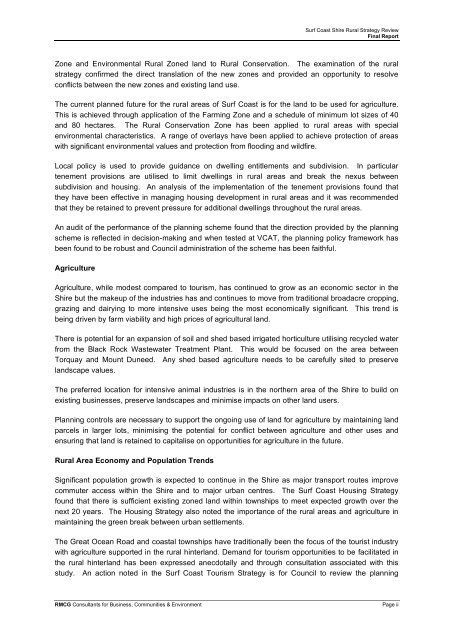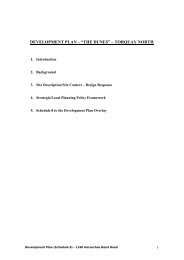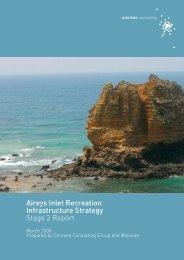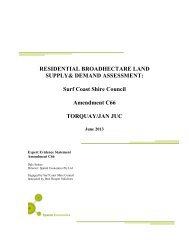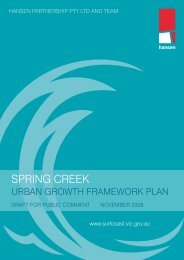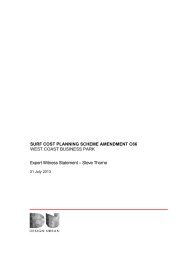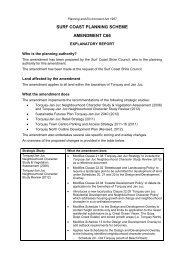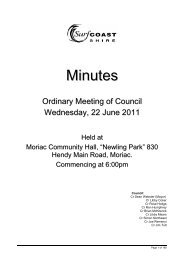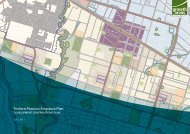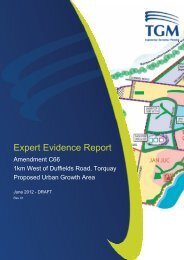Rural Strategy - Surf Coast Shire
Rural Strategy - Surf Coast Shire
Rural Strategy - Surf Coast Shire
You also want an ePaper? Increase the reach of your titles
YUMPU automatically turns print PDFs into web optimized ePapers that Google loves.
<strong>Surf</strong> <strong>Coast</strong> <strong>Shire</strong> <strong>Rural</strong> <strong>Strategy</strong> Review<br />
Final Report<br />
Zone and Environmental <strong>Rural</strong> Zoned land to <strong>Rural</strong> Conservation. The examination of the rural<br />
strategy confirmed the direct translation of the new zones and provided an opportunity to resolve<br />
conflicts between the new zones and existing land use.<br />
The current planned future for the rural areas of <strong>Surf</strong> <strong>Coast</strong> is for the land to be used for agriculture.<br />
This is achieved through application of the Farming Zone and a schedule of minimum lot sizes of 40<br />
and 80 hectares. The <strong>Rural</strong> Conservation Zone has been applied to rural areas with special<br />
environmental characteristics. A range of overlays have been applied to achieve protection of areas<br />
with significant environmental values and protection from flooding and wildfire.<br />
Local policy is used to provide guidance on dwelling entitlements and subdivision. In particular<br />
tenement provisions are utilised to limit dwellings in rural areas and break the nexus between<br />
subdivision and housing. An analysis of the implementation of the tenement provisions found that<br />
they have been effective in managing housing development in rural areas and it was recommended<br />
that they be retained to prevent pressure for additional dwellings throughout the rural areas.<br />
An audit of the performance of the planning scheme found that the direction provided by the planning<br />
scheme is reflected in decision-making and when tested at VCAT, the planning policy framework has<br />
been found to be robust and Council administration of the scheme has been faithful.<br />
Agriculture<br />
Agriculture, while modest compared to tourism, has continued to grow as an economic sector in the<br />
<strong>Shire</strong> but the makeup of the industries has and continues to move from traditional broadacre cropping,<br />
grazing and dairying to more intensive uses being the most economically significant. This trend is<br />
being driven by farm viability and high prices of agricultural land.<br />
There is potential for an expansion of soil and shed based irrigated horticulture utilising recycled water<br />
from the Black Rock Wastewater Treatment Plant. This would be focused on the area between<br />
Torquay and Mount Duneed. Any shed based agriculture needs to be carefully sited to preserve<br />
landscape values.<br />
The preferred location for intensive animal industries is in the northern area of the <strong>Shire</strong> to build on<br />
existing businesses, preserve landscapes and minimise impacts on other land users.<br />
Planning controls are necessary to support the ongoing use of land for agriculture by maintaining land<br />
parcels in larger lots, minimising the potential for conflict between agriculture and other uses and<br />
ensuring that land is retained to capitalise on opportunities for agriculture in the future.<br />
<strong>Rural</strong> Area Economy and Population Trends<br />
Significant population growth is expected to continue in the <strong>Shire</strong> as major transport routes improve<br />
commuter access within the <strong>Shire</strong> and to major urban centres. The <strong>Surf</strong> <strong>Coast</strong> Housing <strong>Strategy</strong><br />
found that there is sufficient existing zoned land within townships to meet expected growth over the<br />
next 20 years. The Housing <strong>Strategy</strong> also noted the importance of the rural areas and agriculture in<br />
maintaining the green break between urban settlements.<br />
The Great Ocean Road and coastal townships have traditionally been the focus of the tourist industry<br />
with agriculture supported in the rural hinterland. Demand for tourism opportunities to be facilitated in<br />
the rural hinterland has been expressed anecdotally and through consultation associated with this<br />
study. An action noted in the <strong>Surf</strong> <strong>Coast</strong> Tourism <strong>Strategy</strong> is for Council to review the planning<br />
RMCG Consultants for Business, Communities & Environment<br />
Page ii


